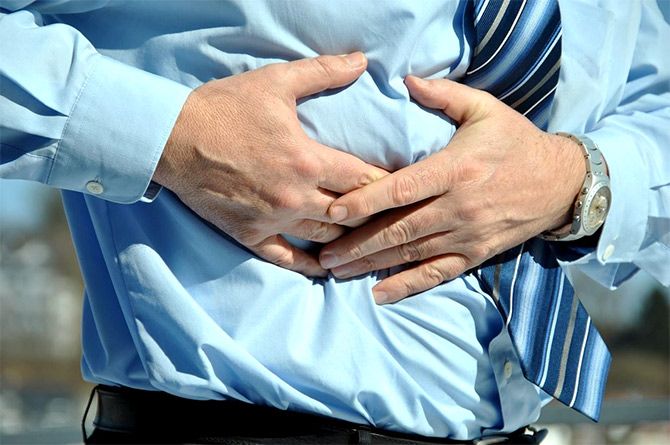 | « Back to article | Print this article |
If you have recently lost appetite and weight and suffer from nausea and vomiting, chances are your liver is at risk, warns Dr Arvind Khurana.

Liver cancer is the fifth most common cancer claiming millions of lives annually.
Other common instances of liver diseases include hepatitis A, B and C.
World Liver Day, celebrated April 19 every year, is a chance to build awareness and understand how important the liver is for our body and how liver diseases can be effectively managed.
Liver is a vital organ which is responsible for synthesis of various proteins, coagulation factors, cholesterol, triglycerides and bile including glycogenesis.
It is also responsible for detoxification of drugs, alcohol and control of infections.
Did you know that your liver is the largest organ in your body? It measures 1500 gm in weight and 15 cm in length.
It is located in the right upper part of abdomen separated from chest cavity by diaphragm.
The liver receives blood from hepatic artery and portal vein and drains blood via hepatic veins into inferior vena cava which ultimately drains into heart.
While the above information may seem fascinating, you must also realise that the human liver is affected by many diseases.
When the disease process is of shorter duration (less than six months), it is called acute hepatitis and when it is over six months, it is called chronic liver disease.
Unfortunately, most symptoms of liver damage do not present themselves till very late.
Diseases such as hepatitis A, B, C, Hepatocellular cancer and cirrhosis often occur because of bad lifestyle choices, excessive consumption of alcohol and drugs, continuous intake of unhealthy food over a long period of time, sedentary lifestyle and lack of exercise.
Currently there is no cure for a severely diseased liver and therefore it is critical to take care of this multi-functionary organ and gland.
Sadly,the only way to manage a failed liver is to get a liver transplant.
Here are a few things you need to know about this important organ so you can take care of it.
Causes for liver disease
Symptoms of liver diseases and liver cancer
How to care for your liver
What are the risks?
A key player in the digestive system of the human body, the liver processes everything we eat and drink including medication.
Due to its multi-functional capabilities, it is also susceptible to viruses, toxic substances, contaminants present in food and water.
Which is why it needs to be well maintained and taken care of.
Another important aspect to understand here is that even when it is under siege, the liver is slow to complain as it is one of the toughest parts of our body.
Consumption of more than 21 small drinks a week in males and 14 small drinks in a week in females increases the chances of developing liver disease.
Accordingly, one should not exceed 2 drinks a day in men and 1 drink a day in women and it is good to have two days off in a week to allow the liver to regenerate.
Once fatty liver has developed it makes sense to avoid alcohol completely.
Similarly it is important to abstain from alcohol for at least six months after acute viral hepatitis to allow for complete recovery.
Often, people with liver problems are unaware as they will experience few or no symptoms.
How to fight liver disease and stay healthy
While there have been major advances in treating liver diseases, there is no complete cure.
Therefore, it is very important to make healthy lifestyle choices to prevent liver damage, and getting the necessary vaccines against viruses which can cause liver disease.
Remaining vigilant and getting health check-ups done regularly can help in the early detection of liver cancer.
A second factor to remember is that liver cancer occurs almost always in diseased livers.
The importance of checking and screening for Hepatitis B and C as well as taking early and sustained care of the liver through a healthy, active lifestyle, therefore, cannot be over-emphasised.
Annual health checks should include a clinical examination, liver function blood test and ultrasound of abdomen.
Fibroscan is a relatively new non-invasive way to study the liver. As the liver gets increasingly damaged, the stiffness increases.
By directing sheer waves through the liver with an ultrasound-like probe, the liver stiffness can be determined from the velocity of wave transmission.
Fibroscan is a sort of virtual liver biopsy and is recommended for individuals who have raised liver enzymes in the liver function tests and in patients with obesity, fatty liver on ultrasound, alcohol intake or those at risk of developing chronic liver disease due to conditions like Hepatitis B or Hepatitis C.
One should opt for the newer versions of fibroscan with CAP (Controlled Attenuation Parameter) facility that can also quantify the fat content in liver.

Dr Arvind Khurana is director and head of department, gastroenterology, Fortis Hospital Shalimar Bagh.